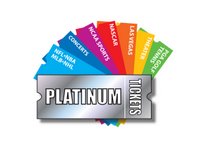NEW YORK (CNNMoney.com) -- Live Nation Inc. and Ticketmaster Entertainment Inc. announced plans to merge Tuesday, combining the nation's biggest concert promoter with the largest seller of tickets for live entertainment.
The new company, which will be called Live Nation Entertainment, will have a value of about $2.5 billion based on current prices and excluding net debt. The merger is expected to close in the second half of the year.
Under the all-stock deal, Ticketmaster (TKTM) shareholders will receive 1.384 shares of Live Nation (LYV) common stock for each share of Ticketmaster they own, subject to certain adjustments.
"Being able to put Live Nation and Ticketmaster into an equal partnership will allow the companies to get through this difficult period and be able to expand live entertainment options to audiences throughout the world," said Barry Diller, chairman of Ticketmaster Entertainment, in a statement.
Still, analysts say the new venture, which is subject to approval by the Department of Justice, raises antitrust concerns.
Live Nation, which recently launched its own ticketing operation, has gone from just promoting concerts to actually selling music in recent months. Artists such as Madonna and Jay-Z have both signed multimillion dollar contracts to give Live Nation the rights to their next few albums.
Ticketmaster, meanwhile, has recently come under fire from regulators for an episode involving TicketsNow, its ticket reseller business.
Last week, Sen. Charles Schumer, D-NY, and Rep. Bill Pascrell, Jr., D-NJ, called for an investigation of how tickets were sold for a Bruce Springsteen show that went on sale on Feb. 2.
In a letter to the Department of Justice, Pascrell said tickets for the Springsteen show were briefly unavailable on Ticketmaster's website because of "technical difficulties." But after the show sold out, consumers were informed that they could buy tickets on TicketsNow for a much higher price.
"As the Springsteen bait-and-switch shows, even on its own, it is very hard to trust Ticketmaster," Schumer said in a statement Tuesday.
"This merger would give a giant, new entity unrivaled power over concertgoers and the prices they pay to see their favorite artists and bands. It must be viewed skeptically and scrutinized with a fine-toothed comb by the Justice Department and the Federal Trade Commission," he added.
In response, Diller told analysts in a conference call that Schumer had made statements that were "factually untrue."
"Ticketmaster is not in the business of denying primary tickets to anyone in order to push them to the secondary market place," Diller said.
Diller said the confusion was due to a "technical glitch" related to a credit card company's inability to process data. "But the confusion was not out of Ticketmaster pushing people to our reseller site," he said.
Jerry Reisman, partner in the Garden City law firm of Reisman, Peirez, Reisman, said the government should scrutinize the deal because it would give the combined company unfettered access to the concert tour business, which is the most profitable area of the music industry these days.
"There's lots of money to be made, and LiveNation controls the touring business and now with the merger that control is complete," Reisman said.
Antitrust issues aside, Live Nation stands to benefit the most from the deal, according to Scott Devitt, an analyst who covers the company for Stifel Nicolaus & Co.
"Live Nation's ticketing platform is not working the way that they thought it would," Devitt said. "Live Nation needs Ticketmaster from a distribution standpoint."
Devitt would not comment on the legal aspects regarding the merger, but said it "gives the combined company significant control of the entire distribution process in the entertainment industry."
The new company is expected to generate approximately $40 million by combining ticketing, marketing data centers and other administrative functions.
The companies said the merger will help improve "access and transparency" by combining artist, promoter and ticketing under one banner. It will also enable more "innovative and dynamic" promotion arrangements, which will create more choice and "a more fan-friendly purchasing experience."
By joining forces, the companies said they will be able to develop new technologies that will benefit consumers.
The merger will also create opportunities to improve attendance at events, the companies said, which will be a boon for concert venues and support a healthier live entertainment industry.
Tuesday, February 10, 2009
Subscribe to:
Post Comments (Atom)

No comments:
Post a Comment